- Home
- Tim LaHaye
Edge of Apocalypse Page 28
Edge of Apocalypse Read online
Page 28
Now that refreshments had been served, Demas motioned for the servants to leave the room. But before exiting, the head butler bent down next to Demas' ear and whispered, "Excuse me, sir, but Mrs. Demas is wondering whether you will be able to address the matter of the vineyards today. Your chief of operations in your Tuscany property resigned a week ago. Your wife is worried that there is no one to oversee all of the vineyard work."
Demas turned to the butler and gave him a withering look.
"Do not--I repeat--do not bother me with those trifles. Do you understand?"
"Yes, sir," the butler whispered. "But what do you want me to tell Mrs. Demas?"
"Tell her anything you want. Now please leave."
The butler nodded courteously and was about to exit, but then Demas thought of something and motioned for him to come back.
When the butler bent down next to Demas again, his master whispered in the butler's ear, "Remember that I want her to be accompanied at all times. I don't want her left on her own. Understood? And please have her escort, who will be helping her with her wheelchair, send me instant messages regularly. I want to know all of her whereabouts and everything about her activities."
The butler nodded once again and swept out of the room.
Then Caesar Demas turned his attention to his visitor who was sipping tea.
The delegate from the Republic of Iran smiled appreciatively now that they were finally going to address the reason for his visit. With his hand he gave a quick stroke to his closely cropped beard and straightened his white silk waistcoat.
"I had expected Hamad Katchi to be part of this discussion. We had dealt with him previously on this."
Demas said, "Unfortunately, we have many enemies." Then he folded his hands, took on a sad, reflective expression, and added, "I fear Mr. Katchi may have fallen prey to some of them. He's disappeared. We haven't been able to locate him. I am so concerned that they may have liquidated him."
"That would be a terrible loss."
"Yes, to all of us."
"Well, then we shall talk, you and I, about these important matters. The RTS specifications...," the Iranian said, "will be delivered...when?"
"We will have possession in the next forty-eight hours. Delivery after that will follow with all possible haste."
"Will technical assistance be guaranteed?" the Iranian asked.
"That's part of the package. We have some physicists and weapons designers who are prepared to help you integrate the RTS into your existing weapons systems."
"The matter of exclusivity has been of great concern to our president," the Iranian said. "We do not want the RTS to turn into a kind of global discount item available to any banana-republic or no-name island."
"Of course not," Demas said, offering to refill his guest's teacup.
The Iranian smiled but held a hand up to say no thank you.
Demas continued explaining. "To reiterate. The RTS technology will only be available to cooperating nations or international unions that are members of our soon-to-be-established League of Ten."
Then he remembered something else and added, "And remember that another benefit is that your nation, and others in our League, will have the benefit of the anti-RTS avoidance technology we expect to develop as soon as our scientists analyze the RTS operating principals. So, you will not only have the benefit of returning incoming missiles to their point of origin, but your nation--and those inside our ten--will also be able to send your missiles into nonmember states, like the United States or their allies...and the wonderful thing is that you'll be able to bypass their RTS system."
The Iranian beamed and said, "Very good. That is all very good."
Caesar Demas smiled back. Then he had a private thought. So glad I chose Atta Zimler for this. Truly reliable men are hard to find.
In a different time zone, in a very different part of the world, Cal Jordan was in his dorm room at Liberty University, changing into his gym trunks and a T-shirt. He was glad, now that he'd thought about it, that he was going to play some basketball with his buddies to get his mind off things.
And he was also glad he had heard from his dad. Who knows, maybe he and I will start connecting. Maybe things are going to be better between us.
Cal was going to turn off the lights in his dorm room before leaving, but suddenly they started to dim--and then they went out completely.
He flicked the switch a couple times. Still no lights. Nice. I wonder how long it'll take maintenance to get this fixed. I've got a lot of studying tonight.
Then he heard a knock on the door.
He swung open the door.
A man in a grey maintenance jumpsuit stood in his doorway.
"Sorry to bother," the maintenance man said. "We're cutting the power to some of the rooms. These old fluorescent lights in the ceiling have to be replaced one by one. It's your turn."
"Lucky me," Cal said, then added, "hope this doesn't take long. I'm supposed to shoot buckets in a few minutes with some friends."
The maintenance man gave a look that lacked full understanding at something in Cal's answer, but he flashed a quick smile anyway. Then he rolled a large covered utility cart into the dorm room. A few students wandered past the open door, looking in with some curiosity, before the man closed the door behind him.
"I've got my portable ladder and tools in here," the repairman said, pointing to the cart.
"Okay, well, do your thing," Cal said and took a step toward the door.
"Could you just help me for just a second?"
"Sure."
"I just need you to catch that big lighting fixture when I hand it down. Won't take too long. If you look up there at the fixture in the ceiling, you'll see where the bulb fits in at both ends. Just be careful not to dislodge the long light bulb when I hand it down to you. The bulb could break. It has some toxic contents inside."
"Doesn't sound too hard," Cal said.
Then Cal took a step into the center of the room and craned his neck to look up at the light fixture.
"I think I see what you are talking about," Cal said as he was studying it.
Right behind him, dressed in the grey maintenance jumpsuit, Atta Zimler was smiling.
He stepped up closer to Cal Jordan, and as he did, he had a satisfying thought.
This is almost too easy.
FIFTY-FIVE
Vice President Jessica Tulrude didn't notice the mild look of panic on the face of her chief of staff. In her working office in the West Wing of the White House, Tulrude had been going over her daily agenda with Lana Orvilla. But Orvilla was squirming and finally had to speak up and announce that she had an item of her own to bring up.
"Madam Vice President," she started out, "you mentioned a minute ago that the senators backed down and withdrew the subpoena against Joshua Jordan on the RTS weapon issue--"
"Senator Straworth had a deal with me. He broke it. All bets are off with that slob."
"Well," Lana tried to suggest, "doesn't this back-tracking by the senators hurt them much more than you...I mean--"
"Are you crazy?" Tulrude shrieked. "I've been the one telling the president to say that we don't need exotic defense weapons systems. My language exactly. That's the official White House position that's been given to the media. We're promoting defense budget cuts, remember? We are also concerned about international criticism over our nuking those North Korean ships with their own missiles. About the potential for civilian casualties if we use this RTS again in the future. We've taken sides in this political catfight. We took sides against RTS. Against Joshua Jordan's defiance of Congress. Remember, Lana, I'm running for president soon. You keep forgetting that."
"Which relates to what I wanted to discuss--"
"Time's a-wasting. Spit it out."
"On the day of the attack on New York City," Lana began, "when we first found out that the missiles were coming. You had enough confidence in me to include me in your briefing with the Pentagon. Things were scary that day. I ha
ve to admit I was pretty frightened--"
"This isn't a rerun of the Oprah show, Lana. Where's this going?"
"I have a brother...don't know if I ever told you this. He works in New York. Manhattan. He's a tech engineer for a radio program."
"Bottom line, Lana! Is there a point to this story?"
"I was worried about him, that's all. In the private meeting with White House staff after the two-minute Pentagon briefing, you said basically...'The Pentagon's going to green-light this RTS weapon and use it against the North Koreans. I don't think it'll work, but what choice do we have?'..."
"I never said that."
"Madam Vice President, you did say that, almost word for word--"
"Well, even if I really did say that, I didn't say it--if you know what I mean. Lana, in our letter to Senator Straworth's committee, we said that the White House did not authorize the use of RTS, nor did we know it was going to be used. We can't now say, oh, gee, sorry we lied, just kidding--"
"So I was worried about my brother, Ted, who works for the Ivan Teretsky radio show in New York. The radio host's nickname is Ivan the Terrible..."
Now Jessica Tulrude was starting to put the pieces together. She stared at her chief of staff with a horrified look, now allowing her to finish her awful confession.
"I was in shock. You said RTS wouldn't work. So I panicked and snuck off and called my brother at the only number I had, the direct studio line, and yelled something like 'go down in the basement, protect yourself, missiles are heading to New York,' or something like that."
"Okay, your brother's family. We can keep him quiet...," Tulrude snapped.
"No, you don't understand. It wasn't my brother who answered. It was some other man. I think it was that Ivan guy, the radio talk-show host who picked up the phone when I blurted all that out."
Tulrude was shaking her head, and her face was wincing as if to say, "No, you poor excuse for a human being, you couldn't have been so stupid."
Then she exploded.
"You gave classified information to a talk-show host! Do you realize that? And what's worse, the reason you tried to call your brother was because you heard me say that RTS is our only hope but I didn't think it was going to work. That means that I knew that RTS was going to be used. That means that they can prove that the White House authorized RTS, you idiot! If someone traces that call from you to this radio guy, it's going to reach back to me. It's going to destroy me politically!"
Orvilla stammered a little and said, "But...but the president was responsible for making the decision, wasn't he? Not you--"
"The president had just suffered another one of his blackouts, you imbecile. Don't you remember? Are you brain-dead?"
There was a silence in the room. Orvilla began to regain her composure now that her boss had just made a confession of her own that even her chief of staff hadn't heard before.
"You never told me the president has blackouts...," Orvilla said in a controlled voice.
"I told you--"
"No. You never did. You've told me he was 'indisposed.' 'Unavailable.' 'Dealing with personal issues.' On that day when the missiles were coming you simply told me to 'shut up' when I asked why the president wasn't in those meetings."
Jessica Tulrude studied her chief of staff closely. She felt a very personal sense of rage wash over her as she entertained her political dilemma. Just one more dangerous person I will now need to control.
In his cubicle at the FBI office in New York, John Gallagher ate a breakfast burrito and considered his options.
The Ivan the Terrible radio-show investigation had been off his mental radar for a while. First, because Miles Zadernack had taken him off that project. Second, because he had a much bigger fish to fry. But Gallagher was now convinced that Atta Zimler was inside the United States. Though he still had to answer the most important question of all: Why had Zimler ventured into such dangerous territory?
It had to be something big. He was sure of it.
Then a phone call came in on Gallagher's cell from Rocky Bridger. After that, he was even more sure.
Gallagher asked him, "Who told you to call me?"
"My friend Joshua Jordan did. He got the lead from another friend."
"Does that other friend have a name?"
"Josh didn't give me the name. Just said he went by the title 'the Patriot.'"
Gallagher clicked with Rocky Bridger's involvement in the Philly torture and death of his son-in-law, Roger French. A murder that Gallagher had linked to Atta Zimler. So Gallagher got up from his cubicle and quickly scurried down to the men's room so he could finish the call without being overheard.
"I'm so sorry about your loss," he said. "I assume the Philly police interviewed you?"
"They did. But I don't think the investigation's making much progress."
So Gallagher decided to ask a few questions himself. After all, Bridger is the one who called him. He didn't actively violate Zadernack's order to get off the Zimler investigation. It didn't take Gallagher long to get into the details of Bridger's connection to Joshua Jordan. Including his meeting with Joshua regularly in some kind of political group, though Bridger refused to refer to the Roundtable by name.
Then Gallagher asked, "Did you ever confide information to your son-in-law, Roger French, stuff about Joshua Jordan? Location of his home? Business information? Description of his family? Private information like that?"
"He knew I was Joshua's former commander and that I was good friends with the Jordan family. I would have mentioned some things about that in casual conversation. Why?"
Gallagher didn't like doing it, but he had to admit the obvious. "You talked to your son-in-law Roger French about Joshua Jordan. Jordan's a controversial guy with access to powerful defense information. Then Roger French is tortured and killed. Maybe for that kind of information. Nothing's certain. But that's a theory."
As Gallagher thanked Bridger for calling, he knew that he'd just delivered a blow to the retired general--right in the solar plexus. Bridger took it like a man. But Gallagher figured that he had to be dying inside, knowing he may have inadvertently contributed to his son-in-law's death.
After the conversation, the FBI veteran stayed in the men's room for a few more minutes, piecing it together. He had followed the news, as most people had, about Joshua Jordan and his Return-to-Sender antimissile system. The FBI agent knew from Ken Leary's last meeting with him in the laundry that Zimler was interested in getting his hands on the RTS technology.
His predicament was excruciating. If he dumped all of this information on Miles, his supervisor just might see the light. On the other hand, Miles was a rulebook guy. He had the edict from the Department of Justice to stop all active investigations into Zimler within the continental United States. In the end, there didn't seem to be much hope that Zadernack would buck that line of authority. Even if he was willing to think about doing that, all he would do would be to slowly go up the chain of command. Go to the division chief, up to deputy director, maybe even up to the director of the FBI himself, and then over the Department of Justice, and up the ladder again, ad nauseam.
And by then, it would be too late. How many more bodies would be found? How much blood spilled? How much American defense intelligence stolen by a sociopathic terrorist?
Gallagher bent down over the sink, splashed some water on his face, and grabbed a paper towel. As he looked in the mirror and saw in his pale, sagging face the visage of an aging FBI agent nearing the end of his career, he decided to give himself a five-second pep talk.
It's the ninth inning in the World Series, John. Step up to the plate...
Rocky Bridger had been troubled by his conversation with John Gallagher. He was already starting to feel the overwhelming avalanche of guilt that he may have led his son-in-law into some kind of a deadly trap. He also felt that he needed to warn Joshua that something might be happening.
But the two men had barely broached that subject when Joshua's phone beeped. He lo
oked at the LCD screen. It read, "Liberty University Office of Security."
He put Rocky on hold and took the call.
"Mr. Jordan?" a man on the other end asked.
"Yes, that's me."
"I'm with school security. We are trying to locate your son, Calvin. There is some concern about his whereabouts. We wondered if you had heard from him today."
"No. The last time I talked with him was yesterday. Is there a problem?"
"Well, Cal didn't show up to a basketball game with some friends. We're also checking into a report from some students in his dorm building about an unauthorized person who apparently entered his dorm room. Look, Mr. Jordan, don't worry. I'm sure he'll turn up."
After that call, and before reconnecting with Rocky, Joshua had to collect himself. He had to settle himself from the deeply unnerving feeling that something was terribly wrong. He flashed back to the warnings that Pack McHenry had given to him about "foreign actors" coming after him.
He now felt an enveloping dread. Should he have been focusing on keeping his family safe in the last few days rather than fighting all those other battles? Was this situation with Cal part of the threat against him? What did they mean by "an unauthorized person" in his dorm room? And that led to just one more, devastating question that Joshua had to ask himself. About his failed responsibility to his son. It was a question that didn't have a clear or easy answer, but it sliced into his heart like a serrated knife.
What have I done?
FIFTY-SIX
The minute that Abigail landed at JFK, Joshua called her and explained that Cal was missing. Abigail was frantic and peppered him with questions. Joshua answered each of them patiently, sometimes several times. Yes, Joshua had tried Cal's cell phone, but it had been turned off and was going directly to voicemail. No, campus security had not come up with anything else beyond their initial investigation: that an unidentified and unauthorized person, dressed as a maintenance man, was seen by students in Cal's dorm entering his room with a large utility cart shortly before he went missing. Cal was supposed to join friends in a basketball game but never showed.

 Glorious Appearing: The End of Days
Glorious Appearing: The End of Days Left Behind: A Novel of the Earth's Last Days
Left Behind: A Novel of the Earth's Last Days Kingdom Come: The Final Victory
Kingdom Come: The Final Victory Nicolae: The Rise of Antichrist
Nicolae: The Rise of Antichrist Desecration: Antichrist Takes the Throne
Desecration: Antichrist Takes the Throne Mark's Story: The Gospel According to Peter
Mark's Story: The Gospel According to Peter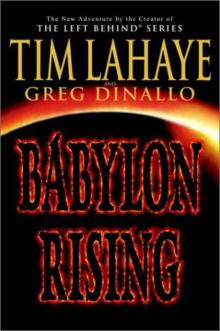 Babylon Rising
Babylon Rising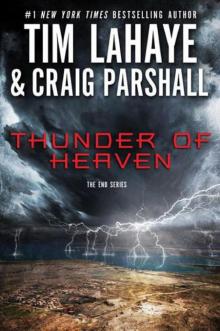 Thunder of Heaven: A Joshua Jordan Novel
Thunder of Heaven: A Joshua Jordan Novel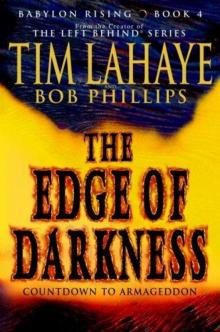 The Edge of Darkness
The Edge of Darkness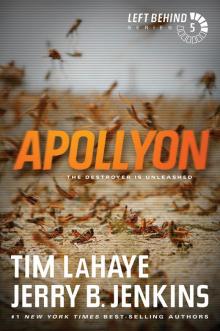 Apollyon: The Destroyer Is Unleashed
Apollyon: The Destroyer Is Unleashed Armageddon: The Cosmic Battle of the Ages
Armageddon: The Cosmic Battle of the Ages Soul Harvest: The World Takes Sides
Soul Harvest: The World Takes Sides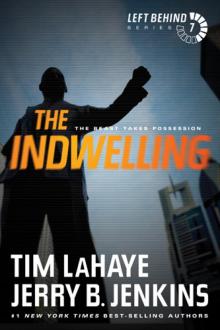 The Indwelling: The Beast Takes Possession
The Indwelling: The Beast Takes Possession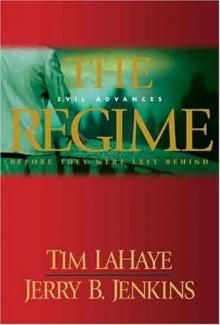 The Regime: Evil Advances
The Regime: Evil Advances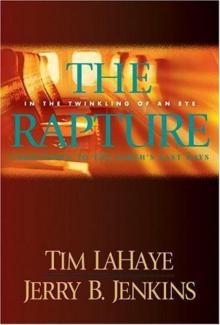 The Rapture: In the Twinkling of an Eye / Countdown to the Earth's Last Days
The Rapture: In the Twinkling of an Eye / Countdown to the Earth's Last Days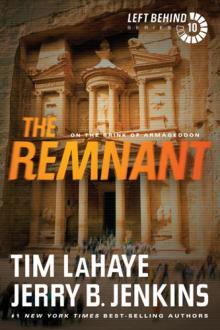 The Remnant: On the Brink of Armageddon
The Remnant: On the Brink of Armageddon John's Story: The Last Eyewitness
John's Story: The Last Eyewitness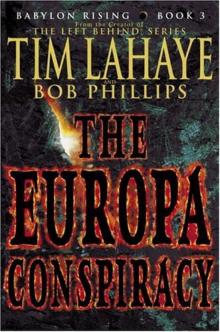 The Europa Conspiracy
The Europa Conspiracy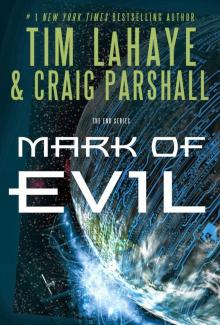 Mark of Evil
Mark of Evil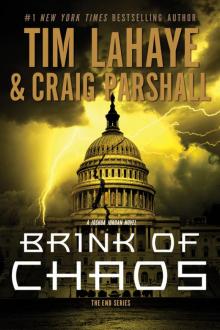 Brink of Chaos
Brink of Chaos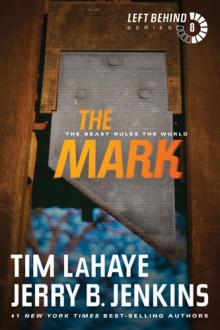 The Mark: The Beast Rules the World
The Mark: The Beast Rules the World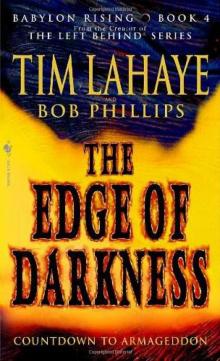 04 The Edge of Darkness
04 The Edge of Darkness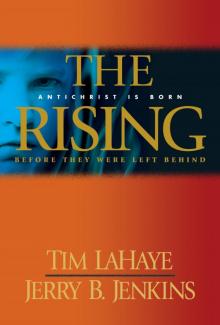 The Rising: Antichrist is Born / Before They Were Left Behind
The Rising: Antichrist is Born / Before They Were Left Behind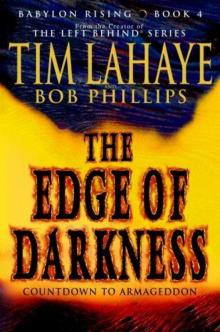 Babylon Rising: The Edge of Darkness
Babylon Rising: The Edge of Darkness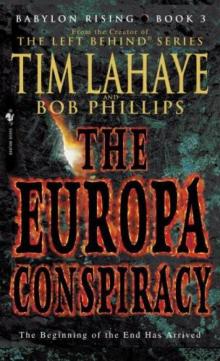 03 The Europa Conspiracy
03 The Europa Conspiracy Desecration
Desecration Left Behind
Left Behind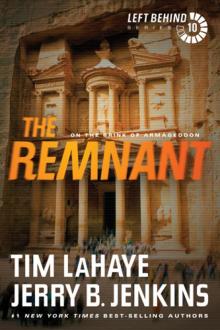 The Remnant
The Remnant Soul Harvest
Soul Harvest Left Behind Book 13: Kingdom Come The Final Victory
Left Behind Book 13: Kingdom Come The Final Victory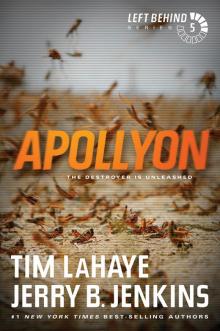 Apollyon
Apollyon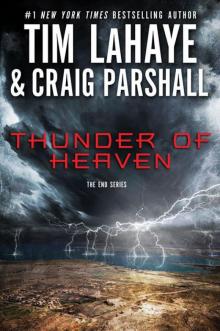 02 Thunder of Heaven: A Joshua Jordan Novel
02 Thunder of Heaven: A Joshua Jordan Novel Glorious Appearing
Glorious Appearing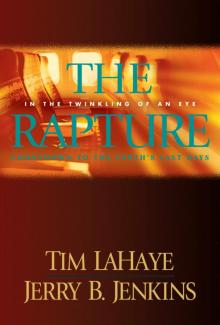 The Rapture: Evil Advances / Before They Were Left Behind
The Rapture: Evil Advances / Before They Were Left Behind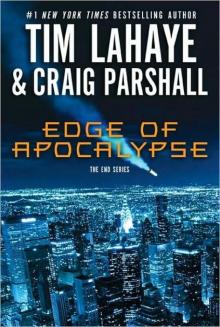 Edge of Apocalypse
Edge of Apocalypse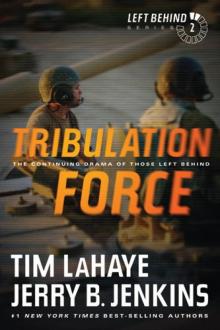 Tribulation Force
Tribulation Force The Left Behind Collection: All 12 Books
The Left Behind Collection: All 12 Books Black Friday
Black Friday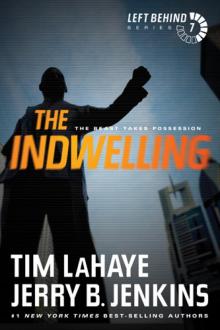 The Indwelling
The Indwelling The Left Behind Collection
The Left Behind Collection